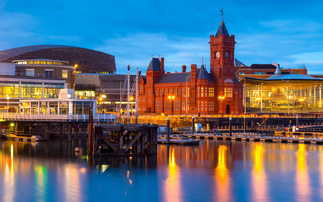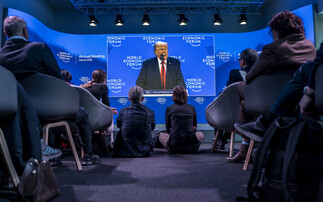The next six weeks promises to deliver the greenest - and the dirtiest - election in British history
The stage is set for the most inspiring, and most dispiriting, election in modern British history. A December 12th date is in the diary and an election is coming well ahead of the new January 31st Brexit deadline date.
That election will prove a critical milestone on the UK's journey towards building a modern, clean, and healthy 21st century net zero emission economy - a celebration of British leadership and brilliance, a democratic competition to establish the most effective decarbonisation path for one of the world's most influential economies.
At the same time it will also provide a die-in-a-ditch exercise in cynical and corrupted electioneering - a contest where proven liars facing on-going ethics and racism probes smash up against unfit-for-purpose election laws in a bid to convince a weary electorate that the parties that have collectively taken the UK to the brink of the biggest constitutional and economic crisis in decades somehow now hold the key to resolving the myriad problems they themselves have created. The cognitive dissonance that will be required over the next few weeks should come with a health warning.
As the month-long malarial fever dream that is Brexit Britain on the campaign trail unhinges itself further from reality, and as a Prime Minister whose giant deadline clock has already gone negative attempts to convince people that he actually won the votes he lost, and anyone who disagrees can go 'technology lesson' themselves, it will be important to remember that the green silver linings are considerable.
A few weeks after climate change is thought to have been a decisive factor in the Canadian election and a year ahead of a US election that looks set to double as a referendum on whether to condemn large parts of Florida to the rising waves, the UK with go to the polls for what could well prove to be "a climate crisis" election.
A host of factors are converging to ensure the main parties launch a genuine competition to attract the growing constituency of voters who regard environmental issues as one of their top concerns.
Polling shows the environment in general - and the climate crisis in particular - are more salient than ever before, especially among younger voters. Businesses and campaigners are loudly demanding that more ambitious decarbonisation policies are delivered, while Extinction Rebellion and striking students have demonstrated an unerring ability to hijack the news agenda. The government will be cognisant of analyses from the last election that suggest a failure to neutralise social media accusations that the Tories were plotting to bring back fox hunting and turbocharge fracking may have cost them seats in key marginals. And the UK now has a cross-party endorsed and legally-binding net zero emission target and parliamentary-declared climate emergency, both of which demand a credible policy response.
Perhaps most importantly, all of the parties will want to position this election as a reset. An opportunity to "resolve" Brexit and set the UK on a new path to either "seize the opportunities Brexit offers" or "halt Brexit and tackle the root causes of the past three years of rolling political crises". Either way, the onus will be on healing divisions, improving lives and prospects, and finding a shared sense of national mission. It is clear that the net zero transition and the green economy will have a central role to play in such a narrative.
Better still for green businesses, unlike previous elections the cross party political consensus in favour of bold climate action will not be a cosy one, where everyone agrees decarbonisation is A Good Thing before moving onto topics where they can hurl abuse at each other. This time around a net zero arms race is already well underway as each of the main parties strive for the sweet spot where ambition meets credibility.
The Tories will opt for a combination of techno-optimism (expect lots of mentions of electric cars, offshore wind farms, and nuclear fusion) coupled with a genuinely solid track record and a wariness about excessive costs. Labour will slam the government's missed targets and inaction in key areas, while ramping up its Green New Deal rhetoric in support of detailed plans that are far more credible and coherent than the muscle memory of nationalisation pledges sometimes suggests. The Lib Dems will promise a pro-business radical centrism, as evidenced by Jo Swinson's recent proposals for a corporate environmental duty of care alongside significant state funding for a massive national energy efficient building retrofit programme. And the Greens and the Nationalist Parties will put their own spin on equally ambitious decarbonisation plans.
It is inconceivable that this focus on the climate crisis will not feature strongly in the campaign. Boris Johnson has repeatedly listed the environment as a top domestic priority for his government, alongside, the NHS, crime, and education, while the recent Conservative Party leadership race was notable for how candidates who had previously shown next to no interest in green issues suddenly started warning that the climate emergency demanded a bolder response. At the same time, all the opposition Parties regard the government as vulnerable on green issues which they also recognise as of being hugely important to both their base and wavering middle ground voters.
This is all adds up to good news for the green economy going into a critical 12 months for the sector. The base line that all the main parties will look to build upon features a firm commitment to delivering net zero by 2050 at the absolute latest, a recognition a more ambitious policy platform is required in support of that goal, a pledge to deliver a successful COP26 Summit, and a commitment to either strong post-Brexit environmental safeguards and sweeping agricultural subsidy reforms or a second referendum. The green political and policy landscape is suddenly in a much better place than anyone could have predicted even a year ago.
The problem, of course, is that these considerable green silver linings are to be found on a dirty great Brexit-shaped cloud.
Barring an unprecedented upset, the choice is between a party that engineered the slowest economic recovery since the Great Depression before splitting the country asunder with an ill-conceived referendum and then mismanaging the fallout from that vote so spectacularly that it plunged the UK into its worst crisis since the Second World War, jeopardising countless livelihoods and the union itself in the process. Or an opposition that looks irreparably divided, bears only the most passing of resemblances to a government in waiting, and has spent much of the past few years failing to land a single meaningful blow on an administration that has reeled from one crisis of its own making to the next. Meanwhile, the prospective Prime Ministers plumb the depths of unpopularity while effectively asking the public to decide which variety of racism scandal they prefer to tacitly endorse.
The full spectrum political nihilism that is being nurtured by the leadership of both parties matters enormously to the green agenda. A project as all-encompassing as the complete decarbonisation of the UK economy within a single career span will require high levels of trust in politicians and political institutions. What remains of that trust is to be found at the charred heart of a now three-year long conflagration. The arsonists are still in charge and this election threatens to pour yet more petrol on the fire.
Again, it is important to remember that a positive path forward is just about possible from here.
This election could provide a mandate for at least some form of resolution to the current interminable phase of the Brexit process. It may simply herald the start of the next phase, but it should avoid the looming risk of a no-deal exit for at least a year and could yet result in a softer Brexit or even a second referendum.
Even if Boris Johnson's deeply problematic hard Brexit deal secures a mandate, there are reasons to hope that a stable Parliamentary majority would allow him to finally face down the ERG ideologues and pursue a workable trade deal with the EU that ensures environmental standards and co-operation are maintained.
The problem is that this theory is often put forward by the same moderate Tories who insisted they wouldn't lose the referendum, and then that they wouldn't allow a hard Brexit, and then that they wouldn't support a Johnson premiership. In reality, they have been repeatedly outmanoeuvred by the Faragists that have taken up residence in the Conservative Party.
Consequently, it remains plausible that this election could trigger a variety of worst case scenarios for the green economy and anyone who cares about the UK's environment.
First up, there is the not insignificant possibility that the pieces could be thrown up in the air and come down much where they stand now. None of the main parties have done much in the past two years to appeal to people who did not vote for them last time out. There is absolutely no guarantee that this election will end the deadlock, especially when you consider that the current split in Parliament is only representative of a country where most polls show the divisions sparked by the referendum are deepening. Economic and political uncertainty could easily roll on for years to come, with all the implications that has for investor confidence.
Second, a shock defeat for the government (and it would be a shock given current polling) may deliver a new government with a hugely ambitious green agenda and a new plan to resolve or even reverse Brexit. Such a scenario might deliver some encouraging economic and environmental outcomes, but it is not without risks. Chief among them is the fear of a right wing backlash that cries betrayal at every turn and sucks environmental issues fully into a gilet jaunes-inspired culture war.
Third, a Conservative victory may trigger a post-Brexit attempt to try and bring the country back together. But it could just as easily be interpreted as a mandate - albeit one with circa 38 per cent of the vote - for an extremely hard and dirty Brexit. A victory for Johnson could give the government the votes it requires to push through an Environment Bill that is currently not robust enough, as well as an unamended Withdrawal Agreement that features no environmental protections and a trap door to a no deal Brexit at the end of 2020.
A leadership team that still faces a host of unanswered questions about its conduct during the referendum campaign could claim that it had had its accountability moment. It would then have five years to pursue whatever agenda it so chose. The current negotiating machinations that have left the door open for a post-Brexit deregulatory drive and a chlorinated chicken US trade deal that could be signed off without Parliamentary scrutiny could yet pay off handsomely for the government's neo-conservative wing and its pollutocrat allies.
Such a scenario becomes even more likely if the nakedly climate sceptic Brexit Party enjoys a strong showing at the polls. With Johnson having failed to deliver on his 'die in a ditch' promise to deliver Brexit this month it is entirely plausible that Nigel Farage could finally secure the electoral breakthrough he has spent two decades pursuing. Were the Brexit Party to secure a handful of seats from Remain-minded Tories, while soft-pedalling in ERG-held seats then it could end up emulating the DUP as king-maker in a new Parliament. A deregulatory, anti-environment, ultra-Hard Brexit would be its first and last demand in any coalition talks.
Well intentioned Ministers insist none of this will come to pass and the Prime Minister will no doubt repeatedly reassert his environmental credentials throughout the campaign trail. But that does not make such concerns any less legitimate. Johnson has only himself to blame for the fact he is not regarded as a reliable witness, even as to his own intentions.
Those moderate and environmentally minded-Conservatives who think the government's commitments to green standards are irreversible and that Johnson would never sell them out for a short term tactical advantage should probably have a chat with the DUP. Or Ken Clarke. Or David Cameron. Or anyone who has ever worked with the Prime Minister to be honest.
The reality is that the same group of people that lied about how easy Brexit would be, before then singularly failing to deliver on their promises, is now seeking re-election on a platform that demands a mandate for a form of Hard Brexit that will make the UK poorer, more isolated, and hugely divided for a generation or more. They intend to secure such a mandate blaming everyone else for their own failure to deliver on their impossible promises. Regardless of whether you voted for Brexit or not, it is not where anyone hoped or expected to be three years on from the referendum. The failure of both government and parliament is almost absolute.
And yet the government's scorched earth electoral strategy could very well work, especially when large parts of the opposition appear intent on making Johnson's arguments for him at every turn.
It may be the greenest election campaign in British history, but it could also end up being one of the dirtiest - in every sense of the word.
A version of this article originally appeared in the BusinessGreen Overnight Briefing email, which is available to all BusinessGreen subscribers.









